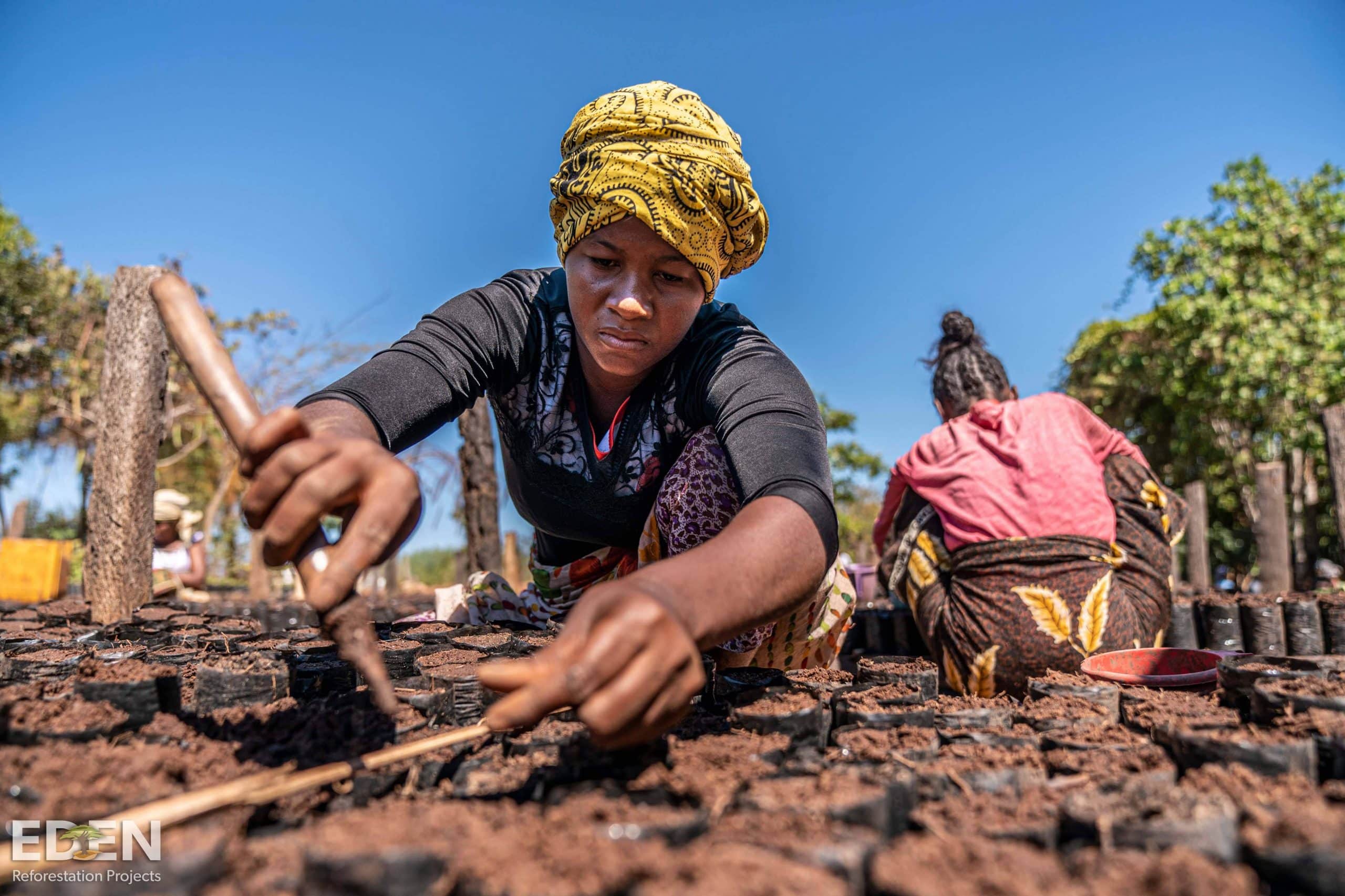Imagine a healthier ecosystem
Supporting Forestry Projects in Madagascar
For every inbound school trip we make a donation to plant trees in Madagascar.

From Eco-Anxiety - Empowerment
Planting tree's with Eden
In partnership with Eden Reforestation Projects we are supporting customers to ‘Imagine’ a healthier ecosystem.


Eco-Anxiety
A deep concern for environmental wellbeing and the state of the future paired with a feeling of inability to affect change.
Empowerment
Connecting with a community of change makers and taking actions that align with a more sustainable future.
Projects we support
About the forests & locations in Madagascar
Deforestation has long been an issue for Madagascar. It is one of the world’s top biodiversity conservation priorities because of its high concentration of endemic species and severe habitat loss rates. In the coastal zone, mangrove deforestation destabilizes the coastline, which increases the vulnerability of coastal communities to storms and other weather events that are becoming more frequent and intense due to human-induced climate change. In upland dry deciduous forests, deforestation threatens one of the world’s rarest and most diverse forest systems. In response to the large-scale loss of mangroves and upland forests in Madagascar,
Eden initiated the Madagascar Reforestation Project in 2007 and has now successfully planted more than 380 million mangrove and dry deciduous trees. Eden works collaboratively with different communities and has full support from national, local, and tribal governments to reforest large areas of mangrove and dry deciduous forests along the coast and inland areas. Eden provides training and financial support to the local community to collect mangrove propagules and strategically plant millions of trees in coastal mangrove systems and upland dry deciduous forests that have been heavily degraded or deforestation
Antsanitia Mangrove
Coordinates: 15°37’15.47”S, 46°26’22.70”E
Akalamboro
Coordinates: 16°12’34.48”S, 44°59’26.88”E
Vilamatsa
Coordinates: 16°16’17.09”S, 44°26’47.66”
Mangaroa/Besely
Coordinates: 15°52’21.03”S, 46°30’32.33”E
- Antsanitia
- Akalamboro
- Vilamatsa
- Mangaroa / Besely
Antsanitia is a vital mangrove estuary that needs long-term protection and restoration. The project site is located along the northwest coast of Madagascar, 15 miles north of the regional capital of Mahajanga.
The project area has a deep-water mangrove estuary that opens to the sea and is surrounded by large swaths of mangrove forest. The estuary is a vital fish nursery for the surrounding ocean and barrier reefs and is an important fishing ground for local Malagasy. It is abundant in giant barracuda, mangrove snapper, jacks, trevally, grouper, stingrays, and various other types of fish. It is also an essential fishery for shrimp, crab, and shellfish and provides habitat to different birds.
Charcoal producers and tree poachers have targeted the mangrove channel and forest beyond. Over the last ten years, these threats have had a tremendous impact on the mangrove forest, and it is dwindling quickly. Eden’s employees actively plant native mangrove species such as Avicennia marina, Rhizophora mucronata, Ceriops tagal, and Bruguiera gymnorrhiza to restore the estuary.
Both the government and local Malagasy communities are opposed to charcoal production and illegal wood harvesting, and they support the long-term conservation and restoration of these sites. As a result of Eden’s reforestation activities, they are empowered to protect what remains of the old-growth mangrove forest and plant areas that have been illegally cleared. So far, Eden has planted more than 5.7 million trees at this site.
This restoration area is located on a lowland mangrove forest along the Akalamboro Estuary surrounding the Akalamboro community in northwest Madagascar. The northern edge of this estuary is part of the Baie de Baly National Park. Before starting the project, the mangrove forests found
in this area were severely impacted by deforestation and forest degradation from charcoal production and wood collection for cooking, construction, and other purposes.
The mangrove forest is unique in that it is a deep-water canal that meets up with an extensive, freshwater river system. This makes it a vital nursery for numerous fish species, abundant Nile crocodile (Crocodylus niloticus), and multiple bird species, including the endangered Madagascar sacred ibis (Threskiornis bernieri). It provides habitat for the critically-endangered giant sawfish (Pristis pristis), once prolific in these estuaries.
The mangrove forest runs adjacent to a fragmented dry deciduous forest with many healthy patches. The grey mouse lemur (Microcebus murinus) is commonly seen at night and during the day. Van der Decken’s sifakas (Propithecus deckenii) are regularly seen jumping through the mangrove and dry deciduous forests. With the help of sponsors and the active participation from the Akalamboro community, Eden began a mangrove reforestation and forest protection project to bring back the forest’s vitality in this area. The project supports local communities to plant and manage mangrove forests on community land surrounding the village, offers long-term employment to local communities and livelihood improvements while protecting the critical biodiversity that relies on mangrove forests to survive. Eden’s Malagasy employees actively plant native mangrove species such as Avicennia marina, Rhizophora mucronata, Ceriops tagal, and Bruguiera gymnorrhiza to restore the estuary. So far, Eden has planted more than 8 million trees at this site and continues to expand.
Vilamatsa restoration area is located on Madagascar’s farthest western point near Cape St. Andre and is a lowland mangrove forest surrounding the Vilamatsa community. Before this project began, the mangrove forests found in this area were severely impacted by deforestation and forest degradation from charcoal production and wood collection for cooking, construction, and other purposes. This community was eager to be a part of our mangrove reforestation initiative in Madagascar for years because of the success of the nearby Mahabana Estuary. Now that they have joined Eden, the Vilamatsa community is a trusted and committed partner in the long-term reforestation and protection of this important estuary.
With the help of sponsors and the active participation from the Vilamatsa community, Eden began a mangrove reforestation and forest protection project to bring back the forest’s vitality in this area. The project supports local communities to plant and manage mangrove forests on community land surrounding the village, offers long- term employment to local communities and livelihood improvements while protecting the critical biodiversity that relies on mangrove forests to survive. Eden’s Malagasy employees actively plant native mangrove species such as Avicennia marina, Rhizophora mucronata, Ceriops tagal, and Bruguiera gymnorrhiza to restore the estuary. So far, Eden has planted more than 11 million trees at this site and continues to expand.
The Besely Dry Deciduous project lies between Route 4 National Road (RN4) and the Betsiboka River Estuary, 10 miles due east from the coast in northwest Madagascar. The site was initially identified in partnership with the Ministry of the Environment in 2013, and since then, Eden Madagascar has dramatically expanded the planting work.
This site was once covered with flourishing dry deciduous forest harboring many endemic species, including eight lemur species. Madagascar’s dry deciduous forests are one of the world’s richest and most unique dry forests with over 800 tree species, many of which are endemic to the island nation. Unfortunately, dry deciduous forests are also severely threatened and in need of active restoration and protection. Like many other sites in the surrounding landscape, this site was almost completely converted to grasslands by fire, uncontrolled grazing, and slash-and-burn agriculture when Eden began its reforestation work.
With sponsors’ help and active participation from the local community, Eden Madagascar began a reforestation project to bring back
the forest’s vitality in this area. The planting teams use a planting palette of over 60 different species (including pioneer, baobab, and agroforestry species) and diverse planting methods to restore areas that had been deforested or degraded. The long-term goal is to restore the entire site and expand reforestation efforts along the RN4 corridor.
its not just about the trees
Community based forest management
When carried out effectively, tree planting projects have many wide reaching benefits to the community.
Social
Supporting communities and empowering lifestyles.
Environmental
Creating diverse habitats for a variety of species.
Economic
Providing a source of income generating forestry services.


